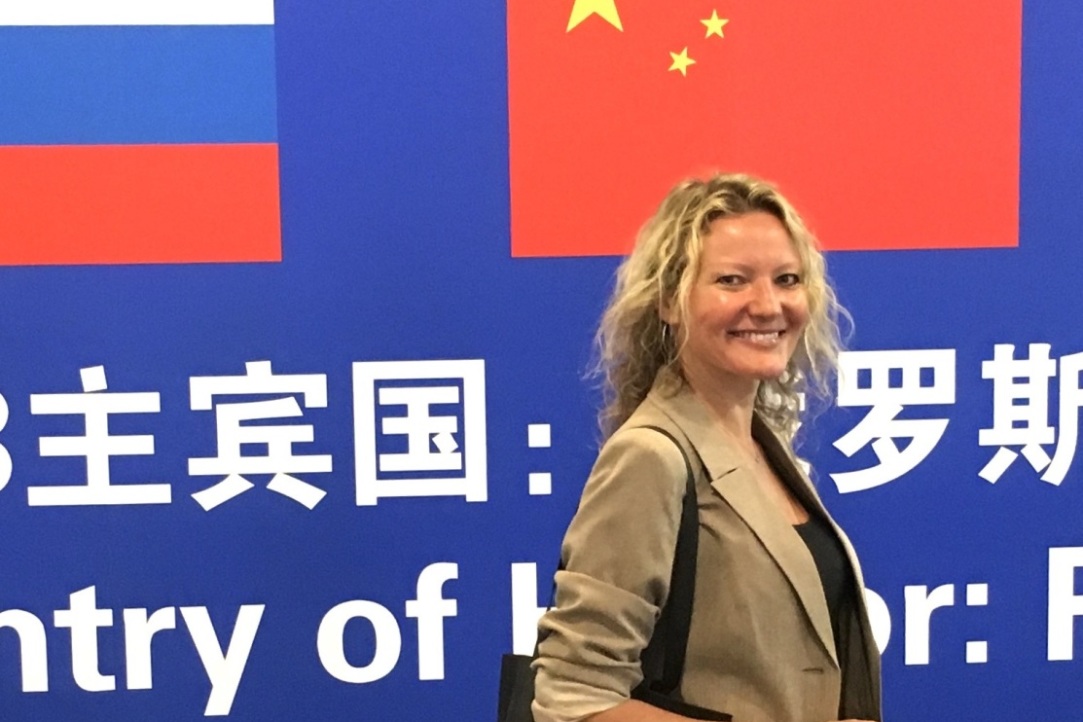Opportunities for Graduates of Interdisciplinary Programmes Focused on Asia: Interview with Natalia Ribberink
In February, Natalia Ribberink, Professor of International Business at Hamburg University of Applied Sciences, an expert on business and investment in Southeast Asia and global trade, gave a course on 'Business and Politics in Modern Asia' master's programme. A first-year student of the programme talked to the Professor about modern geopolitical processes and interdisciplinary education.

To learn more about the master's programme 'Business and politics in modern Asia', please visit the programme page. Information about the admission can be found in the section for applicants.
- Currently, there is a lot of news in the media about Asia and its rapid development. In your opinion, why should students receive professional education in this field?
- Educational programmes focused on Asia are partially needed from an interdisciplinary point of view. Such programmes allow one to study the region in great detail. They provide students with the necessary skills to interpret the dynamics of various processes in Asia, understand their essence, and make data-based forecasts. The combination of theory, facts, and statistics is essential, so we need educational programmes that are specifically focused on Asia.
- What skills are needed to understand the processes taking place in Modern Asia?
- Asia is still an exotic region, and it is difficult to say that all global standards and norms work there. It is worth noting that linguistic skills are necessary for every orientalist scholar since language directly affects the way people think and interpret information. Learning a language depends on your future projects. If you are focused on studying South Korea, learning the Korean language would be helpful. My personal experience shows that the more languages one learns, the deeper one's understanding of behavioural patterns.
- Asia witnesses active competition for leadership now. What do you think will be the leading country in the region in 10 ‒ 20 years?
- It is difficult to predict. We have already seen various forecasts based on statistical observations, data and models, but then they were destroyed because of an unforeseen recession, crisis, or coronavirus. There was a restructuring of the economy and society as a whole.
- What is your attitude to 'One Belt One Road' initiative? Is this initiative an expansion of China to gain more control over resources, markets, and countries? Or is it a peaceful and selfless desire of the country to bring people together?
- A combined approach is used here. Every major geopolitical campaign has a conflict of interest. China is interested in strengthening its strategic position in the global economy. To do this, the country redirects some trade flows. But China will also try to take control through the integration of those countries involved in this initiative.
- What is your opinion about relations between Russia and China? What are the main directions of these countries cooperation?
- I see a high potential for the development of relations between Russia and China and cooperation in many areas: economic cooperation, cooperation in the field of culture and education, and many spheres of activity.
- What do you think are the prospects for Russian-German relations in today's tense circumstances?
- I sincerely hope, that in Germany an objective understanding of what is happening will outweigh the negative aspects. The country is still misinformed and polarized by false news and the geopolitical influence of its main trading partners such as the USA and some EU countries.
- Could you share a methodology for obtaining profound knowledge and skills?
- I am for applied education, so I believe it is important to ask the question: 'How can I apply the knowledge and information I have?' The other important point is the acquisition of universal skillset for analyzing and interpreting major global trends, events and their consequences. It is also important to understand what additional skills you need to develop to work effectively.
- What do you think the chances are for students of master's programs focused on Asia to find a well-paid job in Asian countries?
- As my personal experience shows, qualified young graduates of various backgrounds have the chances to find a well-paid job on the Chinese labour market, especially when they are fluent in Chinese or any other Asian language. They can choose from a wide range of vacancies available to young professionals, and your programme has an important interdisciplinary vector because it combines business and politics. This vector is currently in demand in Asia and around the world as well.
- Do you think there is a difference between Russian and German students?
- It was my first giving lecture at the 'Business and Politics' programme in Russia. In Germany, students of similar courses usually have more homogeneous basic knowledge, experience, and a certain bachelor's degree. In contrast, your group students were very diverse in this regard. You were able to contribute to the discussion from different perspectives, for example, historical, philosophical, and philological. It was a very fruitful work.
- What books and articles for in-depth study of processes in Asia would you recommend reading?
- I recommend reviewing various annual publications, such as regional reports, online resources of international organizations that have experience in analyzing the region you are studying. To understand the main prospects for trade and foreign direct investment, you can read the documents of the United Nations Conference on Trade and Development (UNCTAD). Besides, you can view publications and articles from the Organization for Economic Cooperation and Development (OECD) and the World Trade Organization (WTO), as well as reports from the World Economic Forum (WEF), to better understand global trends and indicators in individual countries.

